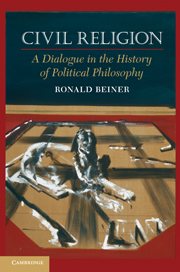Book contents
- Frontmatter
- Contents
- Preface and Acknowledgments
- Introduction
- Part I Machiavelli, Hobbes, Rousseau
- Part II Responses to (and Partial Incorporations of) Civil Religion within the Liberal Tradition
- 9 Baruch Spinoza
- 10 Philosophy and Piety
- 11 Spinoza's Interpretation of the Commonwealth of the Hebrews, and Why Civil Religion Is a Continuing Presence in His Version of Liberalism
- 12 John Locke
- 13 “The Gods of the Philosophers” I
- 14 Bayle's Republic of Atheists
- 15 Montesquieu's Pluralized Civil Religion
- 16 The Straussian Rejection of the Enlightenment as Applied to Bayle and Montesquieu
- 17 “The Gods of the Philosophers” II
- 18 Hume as a Successor to Bayle
- 19 Adam Smith's Sequel to Hume (and Hobbes)
- 20 Christianity as a Civil Religion
- 21 John Stuart Mill's Project to Turn Atheism into a Religion
- 22 Mill's Critics
- 23 John Rawls's Genealogy of Liberalism
- 24 Prosaic Liberalism
- Part III Theocratic Responses to Liberalism
- Part IV Postmodern “Theism”
- Conclusion
- Index
- References
13 - “The Gods of the Philosophers” I
Locke and John Toland
Published online by Cambridge University Press: 05 June 2012
- Frontmatter
- Contents
- Preface and Acknowledgments
- Introduction
- Part I Machiavelli, Hobbes, Rousseau
- Part II Responses to (and Partial Incorporations of) Civil Religion within the Liberal Tradition
- 9 Baruch Spinoza
- 10 Philosophy and Piety
- 11 Spinoza's Interpretation of the Commonwealth of the Hebrews, and Why Civil Religion Is a Continuing Presence in His Version of Liberalism
- 12 John Locke
- 13 “The Gods of the Philosophers” I
- 14 Bayle's Republic of Atheists
- 15 Montesquieu's Pluralized Civil Religion
- 16 The Straussian Rejection of the Enlightenment as Applied to Bayle and Montesquieu
- 17 “The Gods of the Philosophers” II
- 18 Hume as a Successor to Bayle
- 19 Adam Smith's Sequel to Hume (and Hobbes)
- 20 Christianity as a Civil Religion
- 21 John Stuart Mill's Project to Turn Atheism into a Religion
- 22 Mill's Critics
- 23 John Rawls's Genealogy of Liberalism
- 24 Prosaic Liberalism
- Part III Theocratic Responses to Liberalism
- Part IV Postmodern “Theism”
- Conclusion
- Index
- References
Summary
That there is a God, and what that God is, nothing can discover to us, nor judge in us, but natural reason.
– John Locke[T]he pillars of revelation are shaken by those men who preserve the name of religion without the substance of religion.
– Edward GibbonIt is amusing to hear the modern Christian telling you how mild and rationalistic Christianity really is and ignoring the fact that all its mildness and rationalism is due to the teaching of men who in their own day were persecuted by all orthodox Christians.
– Bertrand RussellThe Gods of Moses, Mahomet, and Saint Paul (Jesus is perhaps an exception) do not sound like liberals.
– Brian BarryOne could say that Locke pursues two strategies for domesticating religion without resorting to a civil religion. The first strategy is the one pursued in the Letter Concerning Toleration – namely a privatization of religion as well as the opening up of space for a multiplicity of sects that will help ensure against the dominance or excessive power of any one sect. The second strategy is that pursued in The Reasonableness of Christianity – that is, the strategy of bending religion toward the rationalism of philosophy, a strategy initiated by Spinoza's Theological–Political Treatise and pursued further by a later sequence of towering thinkers (notably, Rousseau, Kant, and Hegel). The basic idea here is that of philosophy taking religion by the hand and leading it toward a less superstitious, less dogmatic, and more intellectually and morally respectable version of itself.
It may seem quite odd to think of it this way, but it is almost possible to see Pascal, with his famous contrast between “Dieu d’Abraham, Dieu d’Isaac, Dieu de Jacob” and “Dieu des philosophes et savants,” as having been the one to enunciate the project of a philosophical or rationalizing religion intended to provide a substitute for biblical religion. No less paradoxical is the fact that it was Hume, the great religious skeptic, who posed the most severe challenge to this philosophical enterprise with his argument (which I discuss in Chapter 18) that no philosopher's religion – whether that of Spinoza or Locke or Rousseau – can answer to the existential longings or psychological needs that elicit conventional religions. Mere reason cannot satisfy longings that have a basis in a sphere other than that of reason. To be sure, Kant and Hegel continued the enterprise of philosopher's religions beyond Hume, but, arguably, they confirmed rather than refuted Hume's challenges. One of the chief purposes of Spinoza's Theological–Political Treatise was to define a new agenda for political philosophy: to appropriate what is morally attractive in Judeo-Christian religion while jettisoning what is not morally attractive by substituting a rationalizing or philosophical religion for the actual substance of biblical religion. This agenda was robustly taken up by a group of key thinkers who would not dare acknowledge it as a Spinozistic philosophical project. Arguably, the leading attempts to pursue this philosophical agenda can be found in Locke's Reasonableness of Christianity, Book 4 of Rousseau's Emile, and Kant's Religion within the Boundaries of Mere Reason (although another top candidate would be the philosophy of Hegel). In this chapter I want to begin sketching the outlines of this shared project, with the aim of eventually judging these efforts by Locke, Rousseau, and Kant in relation to the original Spinozistic agenda.
- Type
- Chapter
- Information
- Civil ReligionA Dialogue in the History of Political Philosophy, pp. 156 - 175Publisher: Cambridge University PressPrint publication year: 2010



